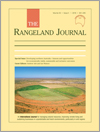The Rangeland Journal
Volume 40
Number 4 2018
Developing Northern Australia – Lessons and Opportunities for Economically Viable, Sustainable and Inclusive Outcomes
In this paper we explore past agricultural developments in the rangelands of northern Australia to determine critical factors in success or failure. Although climatic and environmental constraints, including pests and diseases, remain a challenge for agricultural development, it is mainly factors associated with finances and investment planning, land tenure and property rights, management, skills, and supply chains, which provide the critical challenges. A measured, evidence-based and socially inclusive approach to future agricultural developments will have the best chance of success.
The predominant land use of the culturally and ecologically significant 1.2 million km2 North Australia region currently involves beef cattle pastoralism. Pastoral industry reports show that ~75% of pastoral enterprises are non-economic; our assessment additionally highlights significant environmental liabilities which are not accounted for. We provide evidence that a diversified land sector is both possible and essential for enhancing sustainable social, environmental, and economic regional development.
There have been several high profile policy conflicts related to the northern Australian pastoral industry over the past decade. This paper analyses three high-profile conflicts, teasing out key factors behind them. I conclude that the current system of landscape-scale governance affecting the industry in the north may improve with the adoption of more evidence rich and engaging systems of co-management.
New or expanded agricultural industries in northern Australia require efficient reliable supply chains and transport to domestic and international markets. To provide a comprehensive view of transport logistics costs and benefits due to infrastructure investments and regulatory changes in agriculture supply chains, CSIRO developed the Transport Network Strategic Investment Tool (TraNSIT). As part of a major Australian Government initiative, TraNSIT was used to directly inform the A$100 million Beef Roads Program to target transport infrastructure investments across northern Australia.
Northern Australia has significant potential for agricultural development, but with challenges in achieving livelihood security and sustainable use of natural resources due to risks posed by climate change. Agricultural development informed by advances in research and development and adequate monitoring and evaluation to manage future climatic uncertainties is likely to improve future agricultural production in northern Australia.
Indigenous Australians have the longest connections to Australian landscapes, the highest social and economic marginalisation, and the strongest focus on intergenerational equity and sustainability in development. This qualitative study with senior Indigenous custodians in two North Queensland catchments identified that major irrigation development posed significant risks, but may also contribute to diversified local Indigenous livelihoods. Regional Indigenous planning is required to establish effective baselines for negotiating sustainable development outcomes.
Small-scale irrigation developments have been identified as a means to boost the profitability of northern beef cattle enterprises. With limited empirical data to support economic assessments of the technology this is approached using bio-economic simulation for three case studies (Burdekin - Queensland, Barkly Tableland – Northern Territory, Kimberley – Western Australia). While projected animal productivity increased, the economic results provided a mixed picture of opportunity ranging from negative to moderately positive returns.
Northern Australia will be developed, for better and for worse. In the face of real-world uncertainty and endless complexity, our cultural narratives are the most available variable shaping our perceptions of risk and opportunity. The Regional Natural Resource Management sector, with its mandate for supporting living landscapes and local livelihoods, is presented as a candidate for driving a more consensual and resilient approach to northern development.
Indigenous Australians have diverse development plans consistent with their distinctive aspirations for culture and country and wish to become economically independent. We investigate whether Indigenous land and sea management programs (ILSMPs) can help to do this by stimulating growth in Indigenous businesses, and found evidence to support this. Investment in ILSMPs delivers a wide range of short-term benefits, and may help to kick-start other Indigenous businesses (not engaged in land management), helping to facilitate economic independence.
There is a resurgence of interest in the potential for large dams to supply water for irrigation in Australia’s sparsely populated north. More than 2 billion potential dam sites across northern Australia (an area of ~3 million km2) were assessed in a consistent and objective manner, using the DamSite model, in the largest comprehensive assessment of large dams undertaken globally. It was found that 85 large dams could potentially irrigate 1.34 Mha of land, which if realised, would result in a ~50% increase in Australia’s area under irrigation.




